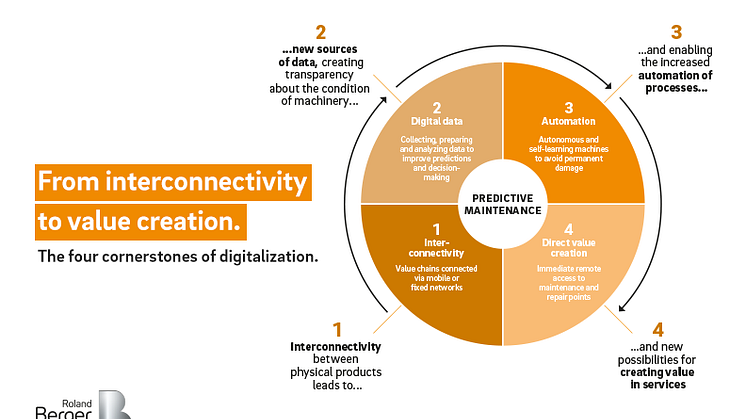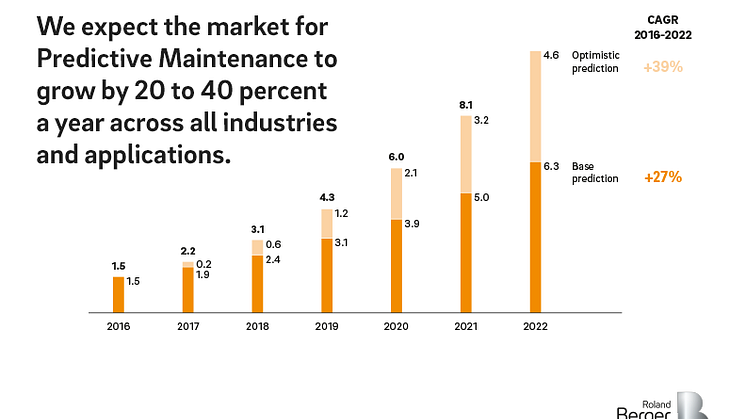Press release -
Global market for predictive maintenance to grow between 20 and 40 percent per year through 2022
Munich, July 2018: Eight out of ten companies are currently devoting time and resources to the issue of predictive maintenance in a bid to improve the cost-benefit ratio of their products, plant and systems. But their engagement often goes no further than collecting operational data. Yet predictive maintenance is about so much more than that. Success is not so much a question of having the "right" sensors and analytics in place but of being open to a new mindset – a service mentality. Ultimately, predictive maintenance can give companies new business models and a corporate culture that's no longer stuck with silo thinking. These are some of the key messages in the latest Roland Berger publication "Predictive maintenance – From data collection to value creation" (Download study here).
Where once companies earned their money mainly from selling hardware and downstream products (classic after-sales), such as packaging machines and their spare parts, the advent of predictive maintenance turns them into power sellers of the actual results their hardware produces, for example, the number of packages processed per hour. In that sense, Services 4.0 converts after-sales into pre-sales. Yet at least one in every two companies that have invested in the topic does not have the budget or even a clear strategy or the will to really tackle the transformation required.
"Predictive maintenance is no longer a question of technical possibilities but of corporate culture and mindset," says Roland Berger Partner Sebastian Feldmann, who is responsible for the Service Excellence business at Roland Berger. "Many companies shy away from revamping their business model and the disruption this would bring to their entire organization. But with this thinking, they are throwing away incredible sales potential and, in the worst-case scenario, jeopardizing their ability to compete in the market long term."
Most important for successfully making the switch from reactive to predictive is a digital mindset. This includes having a flexible, agile and service-minded organization where there is an awareness of and a focus on the challenges customers face. Corporate silos need to be dismantled and functional boundaries overcome – cooperation, cooperation, cooperation is what it's all about. New competencies then need to be developed fast and to do that it must be possible to bring in the right external partners to serve each and every customer individually and well. To help companies through the transition to predictive maintenance, Roland Berger developed a Predictive Maintenance Radar tool covering industrial services. Companies can use it to get a view of the key trends around technologies and business models today.
Enormous market potential worldwide
The prospects for providers in the area of predictive maintenance are extremely promising. As the Roland Berger publication demonstrates, the global market is set to grow between 27 and 39 percent from the 2016 starting point until 2022, ending up at a total value of USD 11 billion. All areas will see growth, from services to components and contracts to IT architecture and software.

The bulk of the growth is forecast to come from Europe, where some predictive maintenance solutions are already on the market or in an advanced stage of development. German providers are also among the frontrunners in the highly competitive international market around the Industrial Internet of Things (IIoT).
Services 4.0 and at its core predictive maintenance, offers a great many opportunities – from optimizing products to bringing significant improvements to the service supply chain to ensuring the best possible use of productive capital. All too often, issues like digitalization, Big Data, IIoT and predictive maintenance are seen as "merely" the expression of technological progress. But that is short-sighted. In reality what they can do is bring about a corporate transformation, one that puts the end customer's needs front and center. And if they can manage that, companies will turn from technology users and data gatherers into service-oriented value creation partners and long-term success stories," says Feldmann in summary.
Categories
Roland Berger, founded in 1967, is the only leading global consultancy of German heritage and European origin. With 2,400 employees working from 35 countries, we have successful operations in all major international markets. Our 52 offices are located in the key global business hubs. The consultancy is an independent partnership owned exclusively by 230 Partners.
For further information, please contact:
Roland Berger
Max Mittereder
Global Marketing & Communications
Tel.: +49 89 9230-8180





